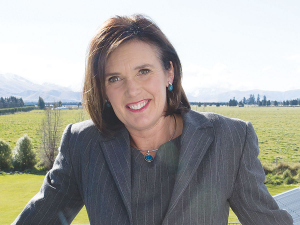Battle for milk
OPINION: Fonterra may be on the verge of selling its consumer business in New Zealand, but the co-operative is not keen on giving any ground to its competitors in the country.
 Leonie Guiney says she will be taking part in the candidate assessment panel (CAP) process this time.
Leonie Guiney says she will be taking part in the candidate assessment panel (CAP) process this time.
Nominations are open for Fonterra's board election but a repeat of the drama that rocked the vote three years ago can be ruled out.
Two sitting directors - Leonie Guiney and John Nicholls - who were at the centre of the polling debacle, are up for re-election this year.
Guiney and Nicholls both confirmed to Rural News that they will be taking part in the candidate assessment panel (CAP) process, where candidates are assessed and recommended in a shortlist to Fonterra's board.
"Yes I will and am happy too," says Guiney, a South Canterbury farmer.
"The election process has been changed back to how it was prior to the year I was removed.
"That means only shareholders can remove incumbents."
Guiney, who is serving her second stint as a director, was blocked in 2017 from standing for re-election after failing to get the CAP's recommendation.
Changes to Fonterra's governance and representation prevented an unsuccessful CAP process candidate from standing as a farmer-nominated candidate.
Changes to voting also included farmers casting 'yes' or 'no' against each candidate. A candidate needed 50% or more yes votes to win a board seat.
After biding her time for one year, Guiney stood again for the board in 2018, this time as a farmer-nominated candidate, alongside Nicholls.
They were up against three candidates endorsed by the panel and Fonterra's board: current chairman Peter McBride, Maori agribusiness leader Jamie Tuuta and former board member Ashley Waugh. However, farmers brushed aside the board's recommendation, rejecting two of their candidates.
Only Guiney and McBride got over 50% of yes votes. For the first time in Fonterra's history, a second director election was held in early 2019, where Nicholls beat Tuuta. Waugh decided not to stand.
In July 2019, after consulting farmer shareholders, Fonterra Co-operative Council, then known as Shareholders Council, made changes to the election rules.
Changes include removing the Fonterra board's power to decide which incumbent directors can stand again. Also gone was the 50% threshold required for successful candidates in contested elections.
The changes also removed the need to hold a second election, with the board given the powers to appoint a farmer director to fill the vacancy until the end of the next annual meeting.
This year McBride, Guiney and Nicholls retire by rotation after serving three years. All three have confirmed that they will be standing for re-election.
Candidates can nominate in two ways. Nominations through the independent process ended last Friday.
These candidates will be assessed by the panel - made up of My Food Bag chair Tony Carter, Warehouse chair Joan Withers and SkyCity chair Rob Campbell.
The independent assessment process candidates will be announced on October 18.
This will be followed by the non-assessment process, where farmers can put themselves forward as a candidate, and this will run from October 18 to 28. The final list of candidates will be announced on October 29 by the Returning Officer.
Successful candidates will start their directorships at Fonterra's annual general meeting later this year.
The World Wide Sires National All Day Breeds Best Youth Camp Best All Rounder plaudit has become family affair, with 2026 Paramount Cup winner Holly Williams following in her sister Zara's footsteps.
DairyNZ is giving New Zealand farmers a unique opportunity to gain hands-on governance and leadership experience within the dairy sector.
Herd improvement company LIC has posted a 5.2% lift in half-year revenue, thanks to increasing demand for genetics.
According to the latest Fresh Produce Trend Report from United Fresh, 2026 will be a year where fruit and vegetables are shaped by cost pressures, rapid digital adoption, and a renewed focus on wellbeing at home.
The Roar is a highlight of the game hunting calendar in New Zealand, with thousands of hunters set to head for the hills to hunt male stags during March and April.
OPINION: The past few weeks have been tough on farms across the North Island: floods and storms have caused damage and disruption to families and businesses.

OPINION: Meanwhile, red blooded Northland politician Matua Shane Jones has provided one of the most telling quotes of the year…
OPINION: This old mutt has been around for a few years now and it seems these ‘once in 100-year’ weather…